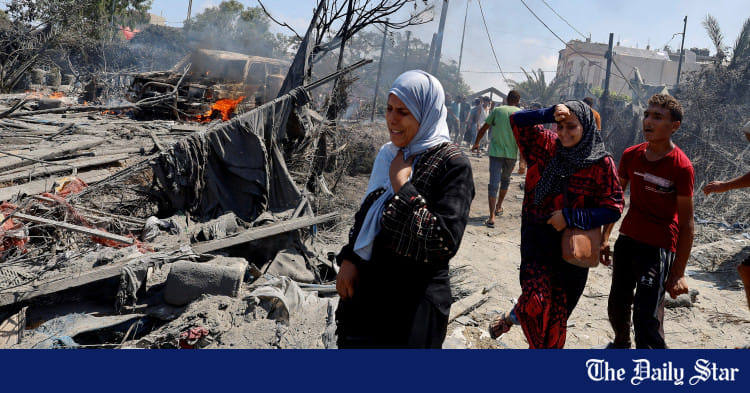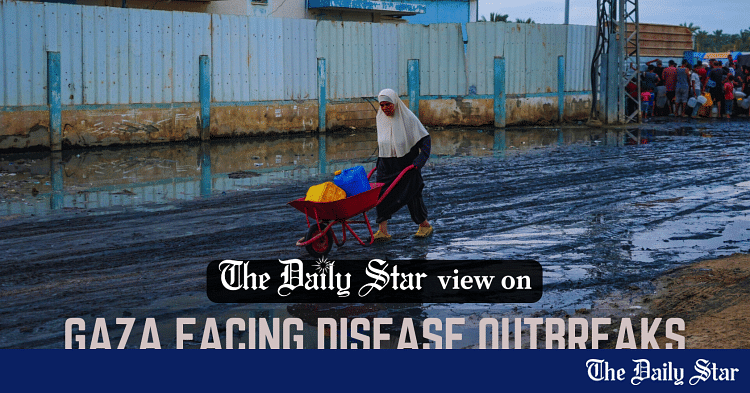Saif
Senior Member
- Joined
- Jan 24, 2024
- Messages
- 16,326
- Likes
- 8,086
- Nation

- Axis Group


Hamas for independent Palestinian government in post-war Gaza
Hamas is suggesting during ceasefire negotiations that an independent government of non-partisan figures run Gaza after war and the Israeli-occupied West Bank, a member of the Palestinian Islamist movement’s political bureau said Friday....
 www.newagebd.net
www.newagebd.net
Hamas for independent Palestinian government in post-war Gaza
Agence France-Presse. Gaza City 12 July, 2024, 21:59

Palestinians make their way over the dirty of rubble past destroyed buildings after the Israeli military withdrew following a two-week offensive from the Shujaiya neighbourhood, east of Gaza City on July 11, 2024. | AFP photo
Hamas is suggesting during ceasefire negotiations that an independent government of non-partisan figures run Gaza after war and the Israeli-occupied West Bank, a member of the Palestinian Islamist movement's political bureau said Friday.
'We proposed that a non-partisan national competency government manage Gaza and the West Bank after the war,' Hossam Badran said in a statement about the ongoing negotiations between Israel and Hamas with mediation from Qatar, Egypt, and the United States.
'The administration of Gaza after the war is a Palestinian internal matter without any external interference, and we will not discuss the day after the war in Gaza with any external parties', Badran added.
A Hamas official told AFP the proposal for a non-partisan government was made 'with the mediators'.
The government will 'manage the affairs of the Gaza Strip and the West Bank in the initial phase after the war, paving the way for general elections' said the official, who did not want his name disclosed.
Badran's remarks came after Israeli Prime Minister Benjamin Netanyahu demanded that Israel retain control of the Philadelphi corridor, Gaza territory along the border with Egypt. This condition conflicts with Hamas's position that Israel must withdraw from all Gaza territory after a ceasefire.
Netanyahu said on Thursday that control of the Philadelphi corridor is part of efforts to prevent 'weapons to be smuggled to Hamas from Egypt.'
The negotiations are occurring in Doha, Qatar and Cairo, Egypt with the aim of bringing about a ceasefire in Gaza as well as the return of hostages still held there by Hamas.
The war began on October 7 with Hamas's unprecedented attack on southern Israel that resulted in the deaths of 1,195 people, mostly civilians, according to an AFP tally based on Israeli figures.
The militants also seized 251 hostages, 116 of whom remain in Gaza, including 42 the military says are dead.
Israel responded with a military offensive that has killed at least 38,345 people in Gaza, also mostly civilians, according to data from the health ministry in Hamas-run Gaza.
Agence France-Presse. Gaza City 12 July, 2024, 21:59
Palestinians make their way over the dirty of rubble past destroyed buildings after the Israeli military withdrew following a two-week offensive from the Shujaiya neighbourhood, east of Gaza City on July 11, 2024. | AFP photo
Hamas is suggesting during ceasefire negotiations that an independent government of non-partisan figures run Gaza after war and the Israeli-occupied West Bank, a member of the Palestinian Islamist movement's political bureau said Friday.
'We proposed that a non-partisan national competency government manage Gaza and the West Bank after the war,' Hossam Badran said in a statement about the ongoing negotiations between Israel and Hamas with mediation from Qatar, Egypt, and the United States.
'The administration of Gaza after the war is a Palestinian internal matter without any external interference, and we will not discuss the day after the war in Gaza with any external parties', Badran added.
A Hamas official told AFP the proposal for a non-partisan government was made 'with the mediators'.
The government will 'manage the affairs of the Gaza Strip and the West Bank in the initial phase after the war, paving the way for general elections' said the official, who did not want his name disclosed.
Badran's remarks came after Israeli Prime Minister Benjamin Netanyahu demanded that Israel retain control of the Philadelphi corridor, Gaza territory along the border with Egypt. This condition conflicts with Hamas's position that Israel must withdraw from all Gaza territory after a ceasefire.
Netanyahu said on Thursday that control of the Philadelphi corridor is part of efforts to prevent 'weapons to be smuggled to Hamas from Egypt.'
The negotiations are occurring in Doha, Qatar and Cairo, Egypt with the aim of bringing about a ceasefire in Gaza as well as the return of hostages still held there by Hamas.
The war began on October 7 with Hamas's unprecedented attack on southern Israel that resulted in the deaths of 1,195 people, mostly civilians, according to an AFP tally based on Israeli figures.
The militants also seized 251 hostages, 116 of whom remain in Gaza, including 42 the military says are dead.
Israel responded with a military offensive that has killed at least 38,345 people in Gaza, also mostly civilians, according to data from the health ministry in Hamas-run Gaza.






































